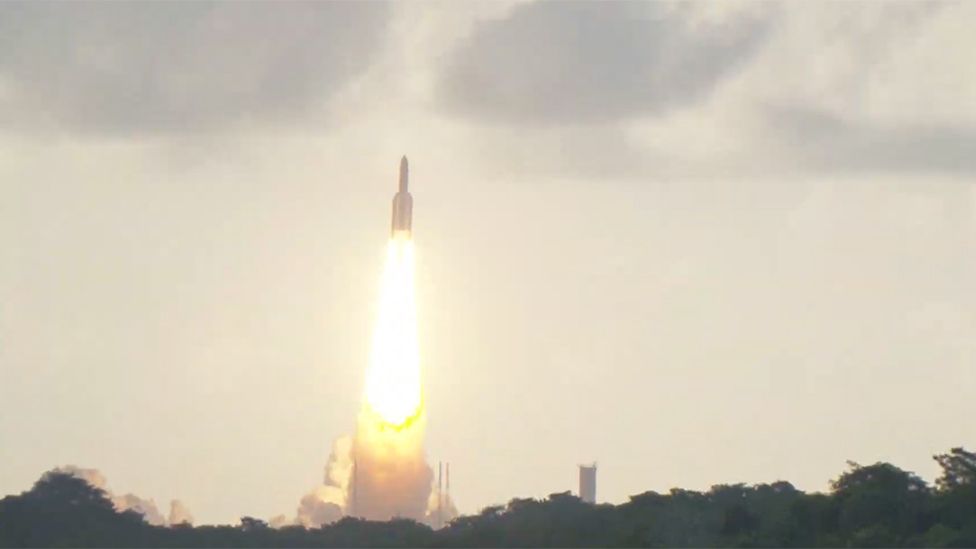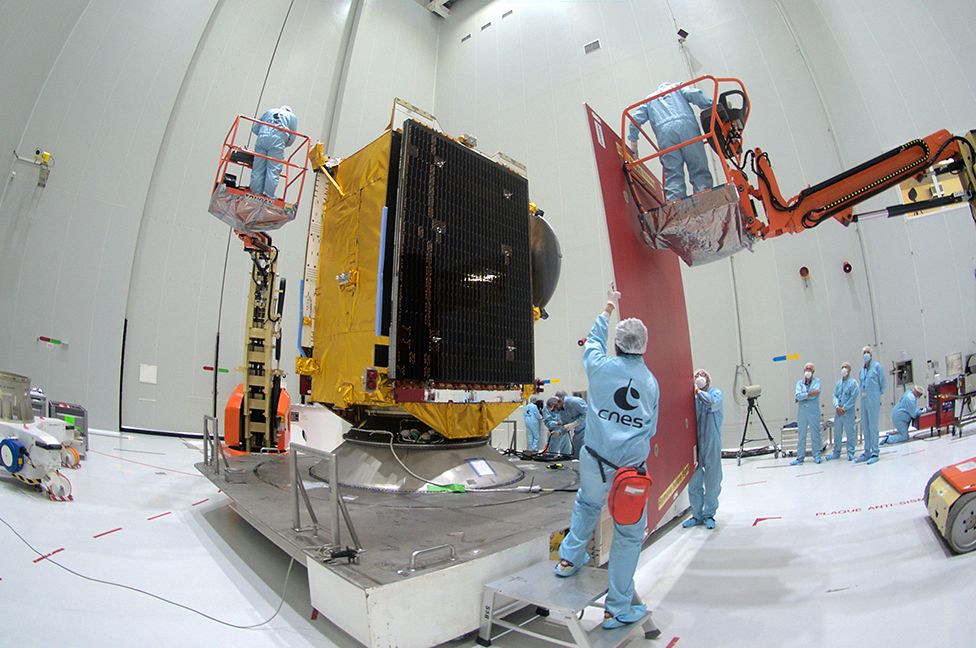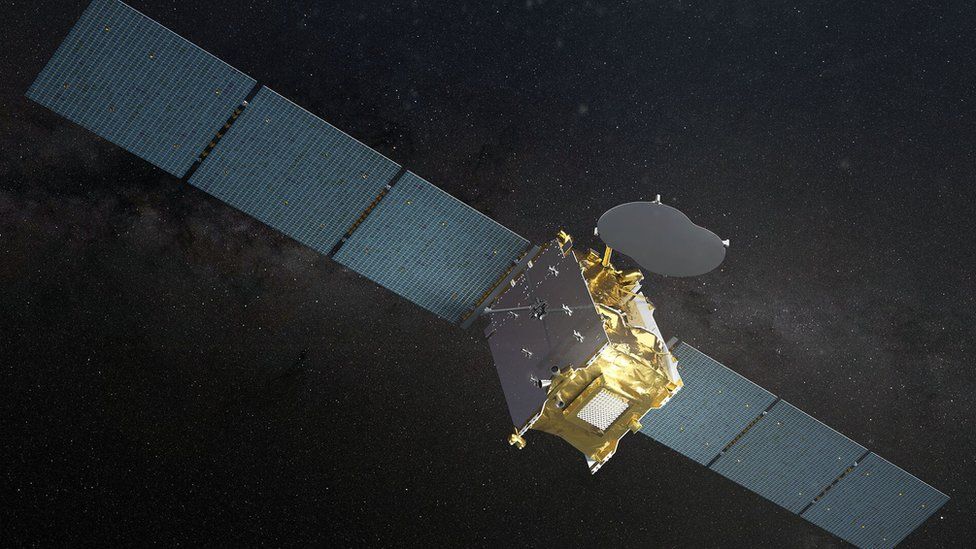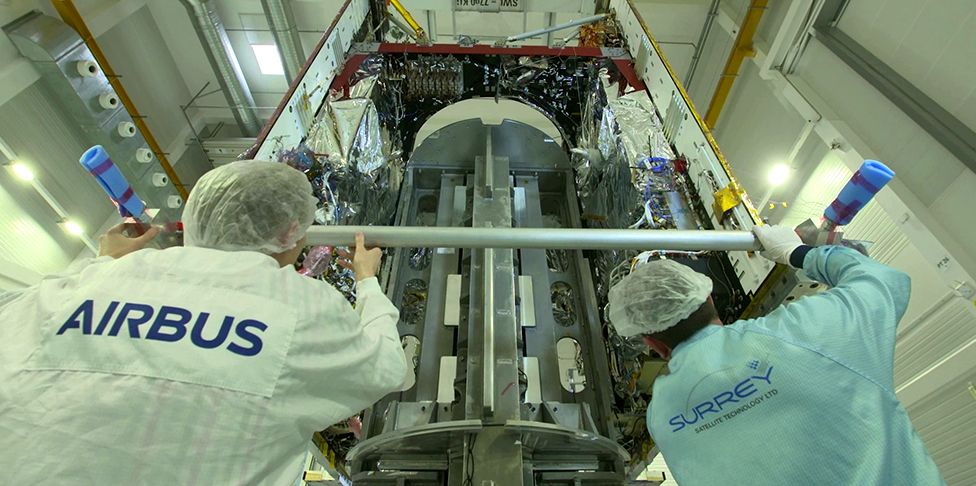
A telecommunications satellite has gone into orbit that UK industry hopes will help maintain its global leadership in the sector.
A quarter of the world's big telecoms spacecraft are manufactured in Britain, and the new Quantum platform is billed as a next-generation product.
It's fully software-defined, meaning it can be reconfigured in space to meet changing market conditions.
Quantum was launched on an Ariane-5 rocket from French Guiana.
It will be manoeuvred to a position 36,000km above the equator, just east of Somalia, from where it will serve principally North African and Middle Eastern customers.
Although the manufacturing of Quantum has been led from the UK, it is the French, Paris-based operator Eutelsat that owns the spacecraft.

Telecommunications satellites are the giants of the sky. These multi-tonne beasts sit high above the equator, bouncing TV, phone calls, broadband and other data services around the planet.
Traditionally, they've been configured in the factory before launch to do very specific tasks in particular markets.
This might mean, for example, transmitting only on certain radio frequencies with shaped antennas to carve out the necessary ground "footprint". But telecoms markets don't stand still, and being able to totally reconfigure an in-orbit platform would allow an operator to adapt to any shifts in the business landscape - without the need to build and launch another bespoke platform.
The operator would simply reprogram the existing satellite. Those antennas could electronically "change their shape", to tailor the bandwidth, power and frequency needs of the new territory to be served.
And this can include very changeable circumstances, such as the evolving communications requirements of aeroplanes during the day as they travel in groups across an oceanic corridor.
Electronic antennas are also more resistant to jamming, making it harder for authoritarian regimes to block the signals, including TV broadcasts, they don't like.
Quantum has the technology to do all this. It's been produced through the European Space Agency's (Esa) Artes programme, an R&D initiative aimed at keeping the European satellite telecommunications industry globally competitive.

The major partners on Quantum, in addition to Esa and the operator Eutelsat, are the UK Space Agency (UKSA) and the British-based manufacturers Airbus UK and Surrey Satellite Technology Ltd (SSTL).
Airbus UK built the telecoms side of Quantum; SSTL produced its bus, or chassis. The special antennas were made at Airbus in Spain.
Airbus has already taken the lessons learned into its "brochure" of new products. The OneSat model it now sells to operators features much of the same technology as Quantum.
"Once you have the technology that allows you to have a fully flexible mission, it changes the way you manufacture satellites," said Dave Phillips from Airbus.
"If you're not having to fully customise a bespoke satellite at the outset, you can move to a more mass-production model for satellite manufacturing, and that brings advantages in terms of lead time and cost," he told BBC News.

Eutelsat intends to make good use of the adaptability of the 3.5-tonne Quantum spacecraft when it enters service after a period of testing.
Communications on the move will be a primary use-case, providing connections, not just to planes but to ships at sea and vehicles on land.
Another application will be in the response to natural disasters.
For example, this type of satellite, had it been operational earlier this month, could have reacted quickly to provide emergency communications to recovery teams during the catastrophic floods in Germany.
Eutelsat is positioning Quantum in an orbital slot at 48 degrees East, but the company knows the spacecraft could be moved anywhere around the globe and still fulfil its mission.
"This ability to adapt to changes, or to establish new markets, will result in a significantly more efficient use of the satellite's resources," said Frédéric Piro, Eutelsat's Quantum programme manager.
Elodie Viau is the UK-based director of Esa's telecoms directorate. She said the products that came out of her R&D department were a good example of how spending in space benefited the wider economy.
"The Euroconsult financial, social and economic health study of 2019 predicted this Eutelsat quantum project would have €20 of general return for each euro invested," she noted.
Friday's Ariane-5 rocket also lofted the Star One D2 satellite. This 6.1-tonne spacecraft is owned by Brazilian operator Embratel and will provide internet connections to Central and South America.
https://ift.tt/3fhNpWi
Science
No comments:
Post a Comment